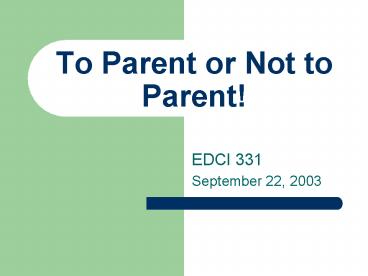To Parent or Not to Parent! - PowerPoint PPT Presentation
1 / 45
Title:
To Parent or Not to Parent!
Description:
To Parent or Not to Parent! EDCI 331 September 22, 2003 Parents come in all shapes and sizes. Objectives: To recognize the impact of parenting on the lives of parents ... – PowerPoint PPT presentation
Number of Views:1360
Avg rating:3.0/5.0
Title: To Parent or Not to Parent!
1
To Parent or Not to Parent!
- EDCI 331
- September 22, 2003
2
Parents come in all shapes and sizes.
- Objectives
- To recognize the impact of parenting on the lives
of parents - To recognize the complexities of parenting in
various configurations
3
Families as systems
- Bronfenbrenners
- Ecological Systems theory
4
Childbirth
- The birth of a child means change!
- Who is impacted ?
- What are some of the adjustments parents face?
5
- What implications do these adjustments have for
teachers? - What about later adjustments?
6
Dual-employed parents
- Conflicts
- Role overload and conflict
- Prioritizing life roles
- Parental,marital,home,
- occupation
- Coping patterns
- Realizing you cant do it all!
7
Single-parents
- Financial concerns
- Role/task overload
- Social life
- Issues with children
8
Noncustodial parents
- Visitation
- Custody
- Child support
- Personal, social identity
9
Stepparents
- Role ambiguity
- High levels of stress
- Successful stepparenting
- Visher Visher, 1990
10
Rewards
- 93 say they would do it again
- Childrens developmental accomplishments
11
Todays objectives
- To recognize differences in parenting styles
including discipline - To recognize the impact of the style of parenting
on children
12
Todays objectives
- To relate parenting styles to cultural issues
- To look at the issue of child abuse and
professional responsibilities
13
Parental Beliefs
- Guide responses to childs behavior
- Realistic beliefs lead to constructive action
(Himmelstein,Graham Weiner, 1991 Pridham et
al., 1995)
14
Parenting Styles
- Authoritative
- Authoritarian
- Permissive
- Uninvolved
15
Authoritative
- Make reasonable demands based on maturity of
child - Set limits
- Insist on obedience
16
Authoritative
- Express warmth and affection
- Listen to childs point of view
- Encourage participation in family decision making
17
Authoritative
- Rational
- Democratic
- Respectful of rights of parents and children
18
Authoritative
- Children are
- Happy
- Self-confident
- Self-controlled
- Independent
- Friendly and cooperative
19
Authoritative
- Older children
- High self-esteem
- Social and moral maturity
- School involvement
- Academic achievement
20
Authoritarian
- Demand conformity
- Little give-and-take
- Disobedience results in punishment
21
Authoritarian
- Parents needs most important
- Suppress childrens self-expression and
independence
22
Authoritarian
- Preschoolers
- Anxious
- Withdrawn
- Unhappy
- Hostile with peers when frustrated
23
Authoritarian
- Boys
- Angry
- Defiant
- Girls
- Dependent
- Retreat from challenging tasks
24
Authoritarian
- Adolescents
- Less well-adjusted
- School performance better than children of
undemanding parent - Less likely to engage in antisocial acts
25
Permissive
- Nurturing
- Accepting
- No demands or controls
- Often lack confidence and organization
26
Permissive
- Children
- Immature
- Little impulse control
- Disobedient
- Rebellious
27
Permissive
- Less persistent on tasks
- Dependent on adults
- Nonachieving behavior
- Effects especially strong for boys
28
Permissive
- Adolescents
- Poor self-control
- Less involved in school learning
- More drug use
29
Uninvolved
- Undemanding
- Indifferent or rejecting
- Often overwhelmed
- Avoid inconvenience
30
Uninvolved
- Extreme form is neglect
- Disrupts all aspects of development
- Emotionally detached, depressed mothers
31
Uninvolved
- Babies show deficits in many domains
- Attachment
- Cognition
- Play
- Emotional/social skills
32
Uninvolved
- Preschoolers
- Aggression
- Acting-out
- Noncompliant
- Demanding
33
Uninvolved
- Adolescents
- Low frustration tolerance
- Poor emotional control
- Poor school achievement
- Lack long-term goals
- Engage in delinquent acts
34
Multicultural issues
- Differing cultural beliefs may impact
parent/school involvement - This does not imply a difference in caring!
35
Multicultural issues
- Legal definitions of child abuse are not
flexible, regardless of cultural differences
36
SES
- Higher SES does not necessarily lead to better
parenting behaviors
37
Child abuse and neglect
- Results from dysfunctional parenting
- Occurs in all cultural groups
- All socioeconomic groups
38
Child abuse and neglect
- More common in younger parents
- Parents with little social support
39
Child abuse and neglect
- 8-55 of abused children exhibit intellectual or
physical impairment - Higher stress levels in families of at risk
40
Child abuse and neglect
- the physical or mental injury, sexual abuse or
exploitation, negligent treatment, or
maltreatment of a child under the age of 18 (
except in the case of sexual abuse)
41
Child abuse and neglect
- Negative comments
- Indifference
- Avoidance of alone time with certain adults
42
Child abuse and neglect
- Blaming
- Belittling
- Sees child as bad, evil
- Finds nothing good or attractive in child
43
Child abuse and neglect
- Fails to keep appointments to discuss child
- Obvious alcohol or drug abuse
44
Child abuse and neglect
- Look for clusters of clues
- If youre sure it wont put the child at greater
risk, you may talk with him about the incident
45
Child abuse and neglect
- The purpose of the discussion is to gather
information for a report - Private, nonthreatening environment
- Not an interrogation!!!!































